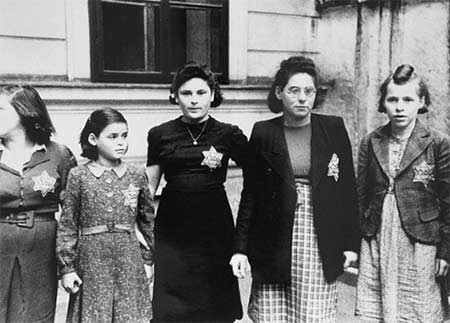
Tuesday, November 3rd
11:00 AM-12:00 PM
Via Zoom: Join Zoom Meeting
Badass Ladies: Women and Resistance in the Nazi Concentration Camps
Dr. Bartrop explores the ways in which women resisted the Nazis in the concentration
camps during the Holocaust. Dr. Bartrop will argue that physical confrontation took
numerous forms beyond that of combat and that each, in their way, enabled women to
take some measure of control over their fate in an enviroment in which survival and
success were in no sense guaranteed.
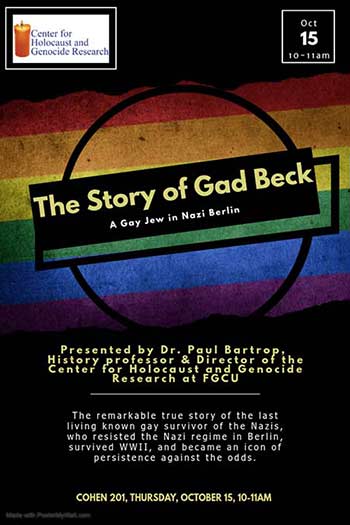
Thursday, October 15, 2020
Cohen Student Union, room CC 201, 10:00-11:00 am
The Story of Gad Beck: A Gay Jew in Nazi Berlin
The remarkable true story of the last living known gay survivor of the Nazis, who
resisted the Nazi regime in Berlin, survived WWII, and became an Icon of persistence
against the odds.
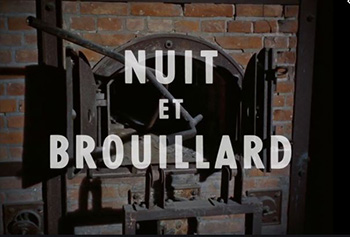
Friday, January 31, 2020
Cohen Student Union, room CC 162, 9:00-10:00 am
Night and Fog
One of the most vivid depictions of the horrors of Nazi concentration camps, the French documentary Night and Fog (Nuit et brouillard) was directed by Alain Resnais and released in 1955. Filmed at several concentration camps in Poland, the film describes the lives of prisoners in camps such as Auschwitz and Majdanek in order to portray the horror of the brutal inhumanity of the Nazis. Night and Fog combines color and black and white footage with black and white newsreels, footage shot by the victorious Allies, and stills, alternating between past and present.
This short film runs for about 30 minutes. After the showing, Dr. Bartrop will give a shot presentation regarding how the film was shot and received after its release.
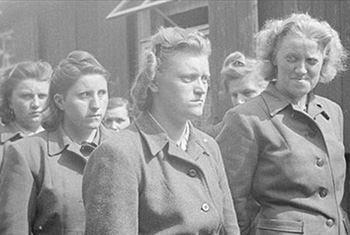
Friday, February 21, 2020
LIB 322, 11:00-12:00 noon
An Infamous Sisterhood: Profiles of Female SS Guards in Nazi Concentration Camps during
the Holocaust
Many studies have been made of those whose actions describe them as perpetrators of the Holocaust. In recent times, some important studies have also included, or focused on, women as perpetrators. In this lecture, Dr. Bartrop considers five such women, who all knew each other and worked together at various times in Nazi concentration camps as guards over Jewish prisoners. Examining their careers provides useful insights into why some German women joined the SS guard detachment, where they were trained, the locations of their postings, and their respective fates. The presentation explores their antisemitic actions, trying to locate them within the broader context of Nazi concentration camp training dating from the years prior to them joining the SS.
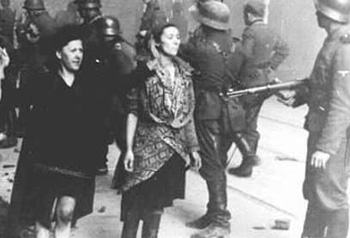
Monday, March 23, 2020
LIB 322, 11:00-12:00 noon
Badass Ladies: Women and Resistance in the Nazi Concentration Camps
This presentation looks at a number of ways in which women resisted the Nazis in the concentration camps during the Holocaust. Several initiatives can be considered. These range from planned and deliberate acts abetting armed confrontation; to saving lives through the positive adoption of means intended to thwart Nazi policies; to finding ways to pass messages from one part of the camp to another; to the very rare cases of escape; to myriad acts of helping to maintain morale that served to crack the edifice of Nazi-imposed terror. By examining these approaches to resistance, Dr. Bartrop will argue that physical confrontation took numerous forms beyond that of combat and that each, in their way, enabled women to take some measure of control over their fate in an environment in which survival and success were in no sense guaranteed.
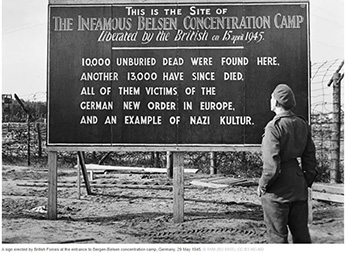
Tuesday, April 21, 2020
LIB 322, 11:00-12:00 noon
“Is it not possible to show some reverence for the dead?” Filming the Horror of Bergen-Belsen
in April 1945
Bergen-Belsen was a World War II concentration camp, situated not far from the town of Celle in north-western Germany. It was originally designated a camp for political prisoners, and, contrary to the image many people today have of Nazi concentration camps, it was not equipped with gas chambers or crematoria. Towards the end of World War II, however, prisoners were subjected to a very limited diet, and most deaths at the camp resulted from starvation, malnutrition, or diseases like typhus and dysentery resulting from an unsanitary water supply. The guards at Bergen-Belsen were notoriously brutal, especially the female contingent, and the camp was considered an especially horrendous place to be imprisoned. In this lecture, Dr. Bartrop will look at the state of this camp—whose images are today iconic of the horror of the Holocaust—and how news of this horror was brought to the world.
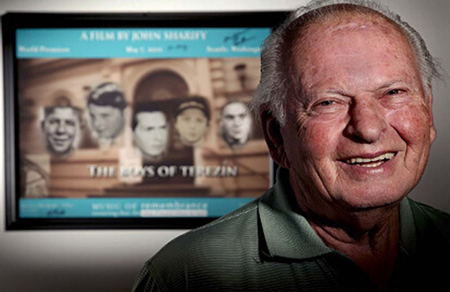
Holocaust survivor, Sidney Taussig, discusses his time at Terezin Concentration Camp
and his experiences with the Brundibar Opera and Vedem Magazine
Monday, November 18 at 11.30am - 1pm
U. Tobe Recital Hall, Music Building, FGCU
This conversation is free and open to the public
Brundibár is a children's opera by Jewish Czech composer Hans Krása with a libretto by Adolf Hoffmeister, made most famous by 55 performances by the children of Theresienstadt concentration camp in occupied Czechoslovakia. Vedem was a Czech-language literary magazine hand-produced by children from 1942 to 1944 in the Terezín concentration camp in defiance of the Third Reich ban on Free Speech, during the Holocaust. The content of Vedem included poems, essays, jokes, dialogues, literary reviews, stories, and drawings. Some 800 pages of Vedem survived World War II.
Contact: Jacklyn Chastain 239 745 4455
Dr Paul Bartrop 239 590 7239
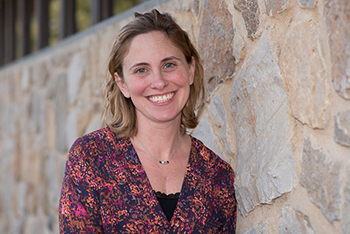
The Center for Holocaust and Genocide Studies is delighted to announce its first ever Scholar-in-Residence, Dr. Jennifer Rich, who will be visiting in the Fall.
Dr. Rich is Co-Director of the Rowan Center for Holocaust and Genocide Studies. She teaches across the College of Education at Rowan University, New Jersey, and is also affiliated with the Thomas N. Bantivoglio Honors College. All of her teaching has an emphasis on social justice and anti-bias education. Her research is focused on Holocaust and genocide education, with a special interest in transgenerational memory and teacher identity. She investigates Holocaust and genocide curricula and best practices for teaching the Holocaust across the K-12 continuum.
Dr. Rich’s first engagement at FGCU will take place on Sunday September 22, 2019, ay 3:00 pm in Sugden Hall Room 111. She will speak on “The Future of Holocaust Memory,” based on her forthcoming book Keepers of Memory. In this, she will be discussing how the Second and Third Generations want the Holocaust to be remembered as we move forward to a time when the survivors are no longer with us.
No registration is necessary, and parking is free. This is a “must see” event!

